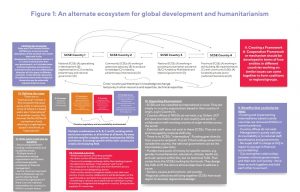New publication offers a vision of an international development system that centers equity and rethinks power: Invitation to engage
15 Sep 2023
Re-imagining, re-configuring, undoing and re-doing, challenging the status quo…Are we reaching a point of critical mass when it comes to conversations and processes that both recognize the short-comings of the current system of international philanthropy and development aid and begin to layout alternative visions? Do we have what it will take to chart new pathways, develop new frameworks and operationalize new ways of working? Among the weaving conversations that will pave the way to #ShiftThePower Global Summit in Bogotá there is already a clear sub-set whose focus is on new thinking and new visions for change, whether through the lens of dignity, decolonization or reforming aid.
Another important contribution to the conversation comes from independent development professional, Themrise Khan, who has recently published a new concept paper, Envisioning an Alternative Ecosystem for Global Development and Humanitarianism, supported by the Centre for Humanitarian Leadership. This paper outlines a new way of both framing and “doing” development that sees countries as the core of change, rather than a global system dominated by only the powerful. It does this by suggesting three key objectives:
- It removes the distinction between Global North and Global South and, instead, visualizes a collective of countries leading ideas that are culturally and economically grounded within specific regions.
- It views no one as international, thus voiding the role of specific International NGOs and allowing domestic state and civil society entities to fill this void.
- It intentionally broadens the funding base from conventional “donors” to include more unconventional sources of financing such as diaspora contributions, national revenue and domestic philanthropy.
The paper presents this ecosystem visually with a series of components:
- Identifying the ecosystem: We begin building this ecosystem around the inclusive term “State and Civil Society Entities” or SCSEs. This signifies an amalgamation of the various formal state and non-state organizations, movements, networks, foundations, membership associations, and informal groups, citizens/community coalitions etc. that work in the global development and humanitarian sectors.
- Cooperation framework: This proposed ecosystem advocates for a cooperation framework between regions and regional or national cause-based coalitions/networks, rather than specifically between the so-called “Global North” and so-called “Global South.” The term “framework” for “international” cooperation, takes the word at its broadest sense and denies this division between “North” and “South.”
- Scope of the ecosystem: This third element is the foundation of our new ecosystem — taking the “I” out of INGOs to level the playing field. Continuing with the earlier element of cooperation, it is imperative that we stop referring to only certain entities as “international” and others as not. Instead, we must encourage the idea of everything being national. There are no “international” entities in this ecosystem because every entity is national by virtue of where it is based and is therefore “international” for every other country.
- Operating environment: Entities that have for decades operated globally through the concept of country offices, will have to give up that civic space to allow existing or new in-country entities to take over. In essence, the “local partners” these INGOs/agencies were previously working with would instead become “collaborators.” It will allow SCSE’s to access a variety of funding sources and mechanisms such as charitable donations, or diaspora contributions, which are less politically motivated than state-based funding from the so-called “Global North” but may have a similar level of resources.
The global aid and humanitarian sectors have been dominated by one powerful group for far too long and it is time to dilute this power by creating a level playing field for all countries to participate in based on their resource attributions. The paper strongly advocates for equity among nations, as a way of achieving global justice. Indeed, viewing countries as equal is the only way forward. This is while also accepting that every country comes armed with its own set of unique challenges which have to be contextualized. That is why a regional power base is recommended that in turn, will feed into global impact.
As part of the “road to Bogotá” Please join GFCF and Themrise Khan to further refine this ecosystem with those who matter the most; communities at the heart of the issue around the world. We are looking for feedback on this concept paper from global partners in the majority world; Africa, Asia/Pacific, Latin America and the Caribbean. Those interested in participating in a series of consultations with Themrise, please contact Eshban Kwesiga at the GFCF (eshban@globalfundcf.org). An open online event will also be held in November (date to be confirmed). In the meantime, a number of other related events are being organized in advance of the #ShiftThePower Global Summit, including a set of conversations on dignity in development on 22 September (see here).
Download the report here.
Download the visual here.



In the world of international development and philanthropy, winds of change are blowing, ushering in a transformational discourse that challenges the established norms and envisions a more equitable, effective future. At its heart lies the acknowledgment that the current system, marked by a constant influx of new theories and methods, might not consistently yield the desired outcomes. Instead, a growing consensus calls for fundamental questions to form the bedrock of development efforts. Enter Themrise Khan’s groundbreaking concept paper, “Envisioning an Alternative Ecosystem for Global Development and Humanitarianism,” backed by the Centre for Humanitarian Leadership. This visionary paper introduces a paradigm… Read more »
We are Humanitarians, anchoring on voices of the Grassroots Sector